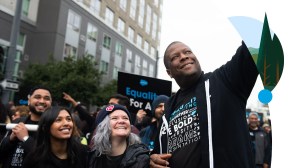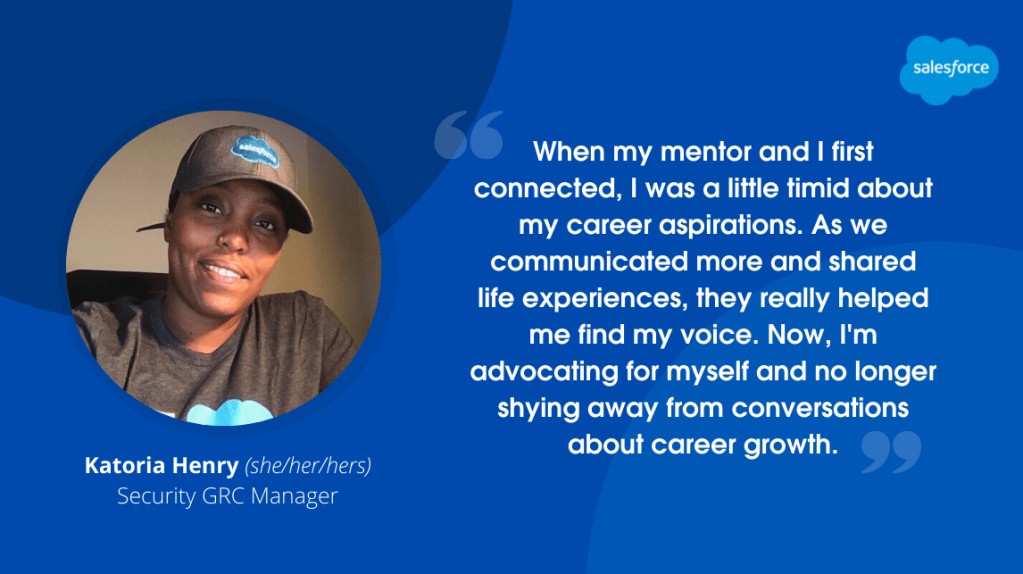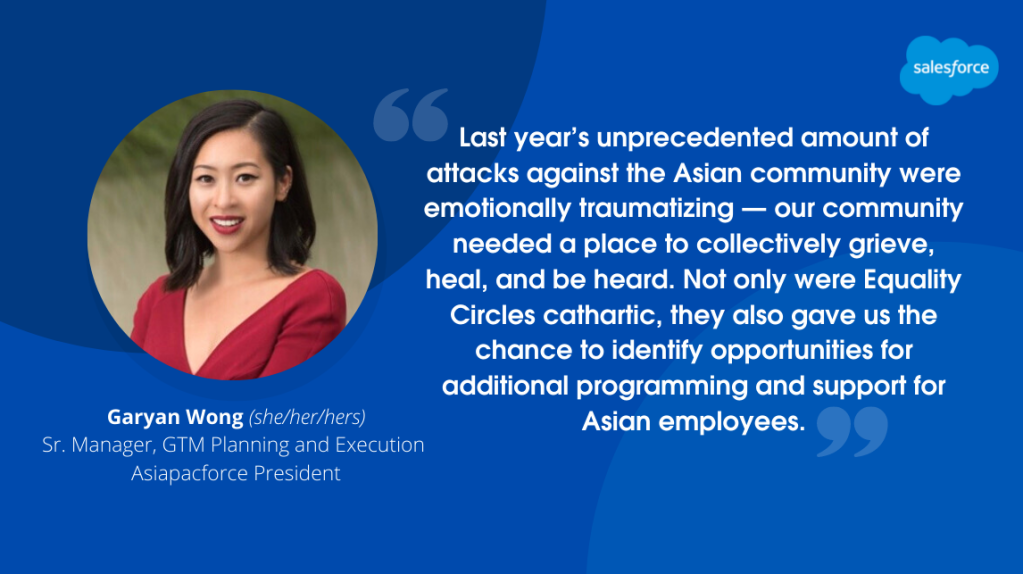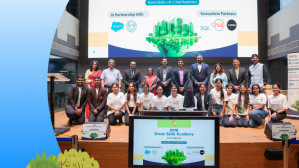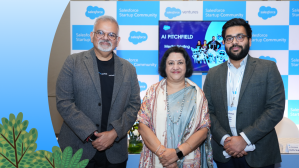Editor’s note: Data is based on 2021 operations for Salesforce (fiscal year February 1, 2021 through January 31, 2022)
Our Next Chapter of Equality at Salesforce
During my time at Salesforce, I’ve been so inspired by the company’s commitment to Equality and all of the people in our extended community who have paved the way to get us where we are today. We learned, we stumbled, we took risks — always guided by our values. I am honored to be able to continue the work as the newly appointed Chief Equality Officer as we evolve into this next chapter.
Over the last two years I’ve watched our company, industry, and world grapple with some of the most difficult moments in recent history. Not only were we faced with a global pandemic that radically shifted the way we work and live – we also were faced with the reality of social injustices, racism, and hate — all made more visible by the disproportionate impact of the health crisis. Companies were called to action, and we chose to lead with our values while redefining what equality truly means to us.
During Black History Month, we reflect even more deeply on the historic events over the last two years and the long-standing history we still need to reconcile. We work together with our community to elevate Black Joy, Healing, and Justice while finding ways to support Black talent in the workplace. As a company, we center our focus on racial equality, justice, equity, inclusion, and most importantly, doing the work.
Equality to us is about taking action toward becoming a workplace and world where everyone has equal access, opportunities, rights, and true justice. We recognize that involves focusing on equity, our systems, and community engagement. In this year’s lookback of our fiscal year, we’re sharing how this intentional focus has led to accelerated impact; and how we will continue to innovate and re-imagine this work as we grow.
Representation Matters and It’s About Hiring and Experience
Our aspiration is to create a workplace that looks like society and to do this we need to accelerate representation. In 2019, we set a goal to have 50% of our U.S. employees from underrepresented groups by 2023. We’ve now met that goal nearly a full year early. Today, 50.7% of our U.S. employees are members of underrepresented groups.
As a company we have three additional public representation goals to continue to accelerate this work, and we’re evaluating new goals to help hold us accountable.
This year, we will also tie executive compensation to environmental, social, and governance (ESG) goals – including representation. This is an important step for us to build greater accountability, lead with our values, and accelerate our ESG initiatives.
Our Progress so Far
Over the last few years we’ve been deeply focused on re-imagining our hiring systems with equality at the center. We saw significant change thanks to new initiatives like: our diversity recruiting team, a more equitable referral process, and the Insiders program, which connects candidates to employees from their community. Underrepresented Minority (URM) overall, as well as Black and Latinx, hiring representation have all increased since last year. Notably Black representation in hiring has more than doubled since we first launched our programs in 2020.
We also introduced our new Hiring Certification requirement, which includes bias training and enabled inclusive hiring practices, for managers and recruiters. The goal is to reduce bias in the hiring process and open up access to underrepresented talent. Over 40,000 employees have participated in the hiring certification program to date.
The progress we’ve seen in hiring has begun to accelerate representation.
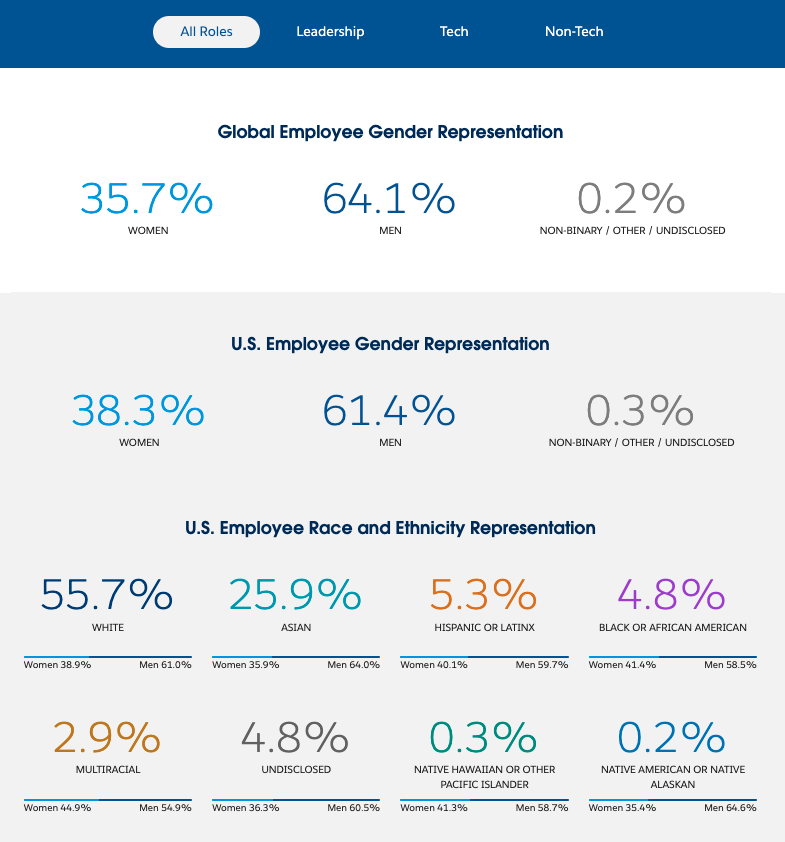
Notably, connected to our focused racial equality efforts and hiring innovations — both our Black and Underrepresented Minority (URM) representation grew at nearly twice the pace as our previous annual averages. As of February 2022, Black representation is 4.8% (compared to 3.6% in Feb 2021) and URM representation is 13.6% (compared to 11.8% in Feb 2021). Not Pictured: U.S. Women and U.S. Asian VP+ representation increased from last year — up to 38.3% and 18.4% respectively.
Areas of Opportunity
While we’ve made significant progress across underrepresented minority representation overall – there is still work to do for our VP+ population, with a particular focus on our Latinx community.
We know that representation does not hinge on hiring alone — we must focus on experience. We continue to see higher attrition trends for underrepresented minorities as well as experience gaps in our employee survey data, particularly for Black women. This year we’re expanding and introducing new equity-focused strategies to shift experience and drive retention.
Changing the Experience
An employee’s experience is defined by the company culture, their leaders, and the talent systems that drive their careers. We know some people experience the world and workplace differently than others. We are working to be the most inclusive company possible where everyone feels supported, valued, included, and empowered to succeed. Here are some of the initiatives we’ve prioritized to help get there:
Black Women Experience
We’re continuing to focus on the experience of Black women in the workplace to address the unique, multi-layered, and intersectional challenges that often confront this community. Research shows, for example, Black women experience microaggressions more frequently and have less access to sponsors. We know when we solve for our marginalized communities, we solve for all. Informed by our employees, research and data insights, we’re taking steps to improve the experience of Black women. Our focus areas include creating access, embedding equality through enablement, innovating our talent processes, and accelerating representation.
As part of this initiative, we are launching a formal sponsorship program for Black women to connect with leaders who can advocate and invest in their career growth. We’ve also created tailored tool kits and opportunities for both Black women and managers to help remove barriers and advance careers. Last year, we launched an all-company training on how to identify and mitigate microaggressions in the workplace. And we’re continuing to enable our employees with inclusive hiring and promotion practices. We’re starting to see progress – Black women representation in hiring has doubled over the last two years.
Equality Mentorship & Sponsorship Programs
Our Equality Mentorship program pairs employees of color with executive mentors to help navigate their careers. The program was founded by equality group leaders in BOLDforce and Asiapacforce to create more access for their communities to senior leaders and is now a core program managed by the Equality team. The program includes resources for mentees and mentors, and a continued learning path for our participants to turn mentors into career advocates and sponsors.
Equality Leadership Programs
We’ve expanded our Underrepresented Minority (URM) Leadership program in partnership with the Executive Leadership Council, and have doubled the participation rate and integrated participation as an input into our key talent processes. This year we piloted our Women’s leadership program and also introduced a new Asian leadership program to accelerate Asian representation in executive roles and increase access and opportunities.
Equality Enablement
To create a truly inclusive culture, we need to give our employees – especially managers — the tools they need to recognize and address bias, foster belonging, create access, and advocate for others. Last year, in addition to our all-company hiring training, we introduced our microaggression training starting with our leaders. Knowing this can’t be a one-and-done experience, but rather a continuous journey, we also included microaggression and bias training in all of our core talent processes.
We continue to enable our employees with tailored trainings, including: Racial Equality Ally, Inclusive Language, Inclusive Promotions, and Inclusive Marketing practices.
Warmline
The Warmline is an employee advocacy program for women of all races and ethnicities as well as Black, Indigeneous, Latinx, and LGBTQ+ employees. It connects employees with advocates who help them navigate career moments, issues of belonging, and courageous conversations.
Equality Groups
Our equality groups are at the heart of our culture. They provide our underrepresented employees with community, safety, and support. They also help build allyship and connection across our company. We recognize the incredible value and commitments of this work. These employees are leading Equality from the front lines as volunteers. That’s why we continue to offer recognition, as well as compensation for globally elected Equality Group leaders.
The last year was incredibly difficult for some of the communities represented by these groups. The Equality team worked closely with the leaders to provide space to process, grieve, learn, and support those impacted through what we call ‘Equality Circles’.
Gender Inclusive Benefits
Our equality groups often help inform and guide us to ensure we are being inclusive of all our communities. Belonging is about being able to show up as who you truly are without fear or barriers. Last year, after listening to our LGBTQ+ community and consulting with Outforce, we went to work on a set of safe and accessible new benefits to support the unique needs of our global transgender and non-binary community. This included gender affirmation medical reimbursement, gender affirmation leave, wardrobe reimbursement, legal fee reimbursement, counseling services, and more. Learn more here.
Continued Action on Racial Equality and Justice
This month, our equality group for Black employees and their allies — BOLDforce — is elevating Black Joy, Healing, and Justice. This is especially important given the backdrop of the events of the last two years.
In 2020, we formed the Racial Equality and Justice Task force, inclusive of BOLDforce leadership and our most senior leaders, to support the Black community and take action against racism and hate. Last year, with the rise of anti-Asian violence, we took action to add new commitments to support the AAPI community.
It is important that work continues with the same energy we started and that it evolves as we do. The task force takes actions across four P’s: People, Purchasing, Philanthropy, and Policy. We’ve already shared some of the integrated results of our People strategies this year. Here’s the progress across our other three pillars to date:
Purchasing

We’re continuing to work toward our goal of spending $100 million with Black-owned businesses by 2023 and have increased our spend with minority-owned businesses by 50%.
Through Salesforce Ventures, we are committed to increasing our overall number of Black and URM founders by more than 3x by 2023, and have already invested more than $100 million in Black and URM-led companies since the launch of the Taskforce.
We’ve introduced a number of new programs to deepen our investment and support for minority-owned businesses:
- We launched our 12-month Black-Owned Business Mentor Program, providing sponsorship, education, and networking opportunities to 25 Black-owned businesses.
- We formalized an accelerated pay program to offer verified small business suppliers — which includes many diverse businesses owned by racial minorities, women, veterans, LGBTQ+, and people with disabilities —a shortened net 15 days payment term. More than 450 suppliers have signed up to receive this accelerated payment option.
- We supported the National Minority Supplier Development Council CRM License Initiative, offering CRM licenses and support to more than 100 small and minority-owned businesses.
Philanthropy

We support organizations driving long-term change for communities of color. We intend to donate $200 million and 1 million volunteer hours toward organizations focused on racial equality and justice over five years.
- Since June 2020, we have donated over $82 million to advance racial equality and justice, putting us 41% of the way toward our five-year donation goal.
- Since June 2020, we have delivered over 223,000 racial equality and justice-related employee volunteer hours, and over the past year, we delivered $1.6M in pro bono services aligned to Sustainable Development Goal 10, Reduced Inequalities.
- Tableau Foundation released the Do No Harm Guide in partnership with the Urban Institute, which helps people collect and present data through a more diverse, equitable, and inclusive lens. The Guide is part of the Tableau Foundation’s Racial Equity Data Hub.
Policy
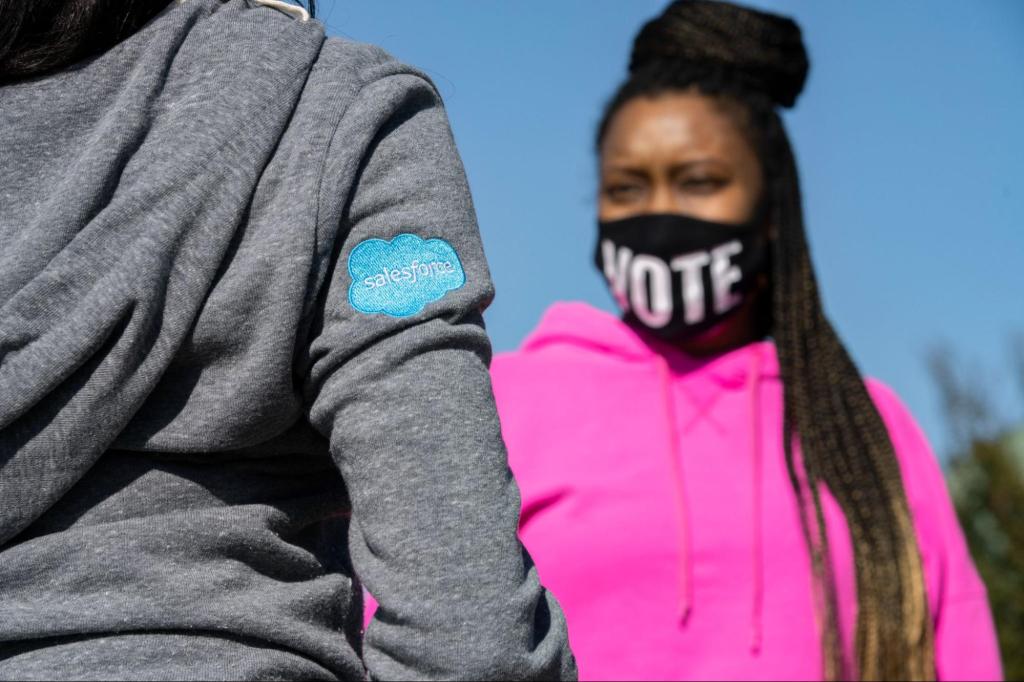
Salesforce’s Government Affairs team continued the advocacy work we began in 2020, focusing on police reform, criminal justice reform, and the protection and expansion of voting rights in the United States.
- In 2021, Government Affairs analyzed and tracked over 275 pieces of legislation that aligned with our policy priorities, directly advocating for more than 20 pieces of legislation and engaging with more than a dozen U.S. Congressional offices on police and criminal justice reform.
- Opposed specific provisions of voting reforms in Georgia and Texas that were not aligned with our policy principles, and supported voting rights legislation in Washington State.
- Supported the John Lewis Voting Rights Advancement Act (VRAA) through direct advocacy, earned media, and as a member of the Business for Voting Rights coalition.
Elevating Our Stories and Taking Action Together
We are not alone in this work — we are working together with our partners, our customers, our ecosystem, our industry, and our greater communities to drive equality for everyone. We continue to look for ways to use our platforms to elevate underrepresented and underheard voices and have conversations about the work we can all do to drive change. Last year, we hosted our fourth annual racial equality summit, Representation Matters, our third annual gender equality summit Trailblazing Women, discussed topics like Black healing and wellness with Minda Harts, and partnered with our community to share resources on ways to take action to address racism and hate. Together we can advocate for others, open doors, change systems, and create a more equal and just world.
Learn more about Salesforce’s commitment to equality at Salesforce.com/equality
